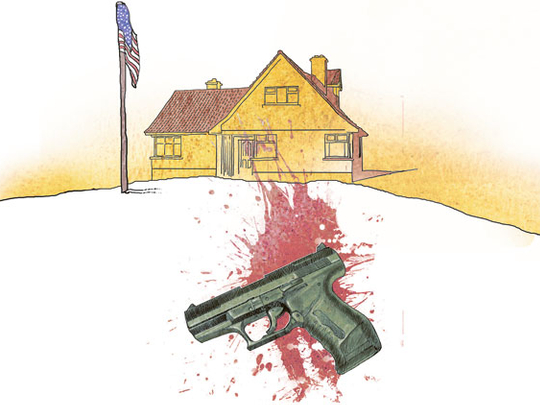
Only days after being sworn-in last week the members of America's new Congress received a grim reminder that words have consequences.
For the most part, the frenzy of commentary that followed Saturday's gun attack on Congresswoman Gabrielle Giffords in the US state of Arizona said more about the commentators themselves than it did about the incident. It did, however, highlight the ways in which 21st century political polarisation differs fundamentally from its 18th through 20th century versions.
Contrary to what some commentators would have you believe, inflammatory rhetoric is not a particularly new development in American politics. There is even a strong case to be made that today's most outrageous political accusations are, historically speaking, pretty tame: in 1800, supporters of incumbent president John Adams warned that were Thomas Jefferson win that year's vote "murder, robbery, rape, adultery and incest will be openly taught and practised".
Jefferson, of course, did win and the country seems to have prospered nonetheless. It should also be noted that Jefferson's supporters said equally vile things about Adams — and none of that stuff was true either.
The obvious difference is that the political media of 1800 — newspapers and pamphlets, for the most part — lacked the reach of television, radio and the internet.
The hours following the Giffords shooting seemed to leave some media outlets in a quandary. It was difficult for many to avoid an obvious conclusion: that America's increasingly venomous political discourse somehow contributed to whatever drove the gunman who shot Giffords through the head in a Tucson supermarket, killed six people, including a nine-year-old girl, and wounded 19 others
But if overheated rhetoric is, indeed, to blame what is to be done about it? Free speech is perhaps the most cherished of American rights. Legally speaking, it is also one of the strongest. There are very few things you can get arrested for saying or advocating in America.
But such broad freedom also implies the need for a degree of personal responsibility. Since the government is not going to get into the business of policing political speech there has, historically, been a tacit understanding that America's more mature political leaders will act informally, disowning their supporters when they go too far.
When right-wing militia movements gained sudden prominence in the 1990's conservative leaders both in and out of government were at pains to condemn them just as an earlier generation of Republicans had done with the crazier offshoots of the John Birch Society in the 1950's and 60's. Later in the 60's, and into the 70's, leftist ‘revolutionaries' found equally little support among the Democratic party's leadership.
There has been, in short, a conspiracy of the middle against the country's ideological fringes. The down-side of this is the fact that America's political discourse takes place within a relatively narrow ideological band. The up-side has long been a political culture relatively free from violence, at least when compared to many other parts of the world.
Democrats now argue, however, that if such a political bargain exists, the Republicans are not keeping up their end of it.
As evidence they cite candidates such as Sharron Angle who, in the run-up to last November's election, warned that her supporters might feel the need to resort to "second amendment remedies" if she lost her bid for a senate seat from Nevada (the Second Amendment to the US Constitution is the one that guarantees Americans the right to own guns).
In a similar vein, a House candidate in Alabama aired a television ad in which he described Obama's health care reforms and other programmes to a bunch of actors dressed like America's founders and equated his campaign with their struggle against "tyranny". The spot ended with the "George Washington" character solemnly intoning "gather your armies".
In another noteworthy ad Ben Quayle, the son of former vice-president Dan Quayle, sought a House seat in Arizona by solemnly declaring "Barack Obama is the worst president in history". He promised, if elected, to "go to Washington and knock the hell out of the place".
Quayle won. And though both Angle and the guy in Alabama lost, Democrats emerged from November feeling that Republicans had broken most of the unwritten rules of American politics in their pursuit of victory.
Don't count, however, on the political class takes a collective deep breath and reassessing their approach to life in the wake of the Giffords shooting. The technological genie cannot be put back into its bottle. We are now, it seems, well into a rougher political age than America has seen for some time.
Gordon Robison is a writer and commentator who has covered the Middle East for ABC News, CNN and Fox since the 1980s. He teaches Middle East Politics at the University of Vermont and has taught Islamic History at Emerson College.









